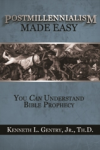POSTMILLENNIAL UTOPIA?
 PMW 2023-057 by Kenneth L. Gentry, Jr.
PMW 2023-057 by Kenneth L. Gentry, Jr.
One PostmillenialWorldview read asks: “What is your response to the ‘Utopia’ charge leveled by (especially) Premills? This is a common charge levied against the postmillennialist. And the erstwhile postmil would do well to consider the matter.
Unfortunately, in the eschatological debate, postmillennialism is the easiest eschatological option to misconstrue. This is due to its going against the prevailing pessimistic expectations of the other millennial views. Hope for our historical future seems like Utopia to these folks. And as we know “Utopia” comes from the Greek: ou (“not”) and topos (“place”) and means “no-place.” So if postmillennialism is utopic, it is going no place.

Postmillennialism Made Easy (by Ken Gentry)
Basic introduction to postmillennialism. Presents the essence of the postmillennial argument and answers the leading objections. And all in a succinct, introductory fashion.
See more study materials at: www.KennethGentry.com
Unfortunately, faulty hidden presuppositions often taint millennial arguments, even though the evangelical and reformed critics are seldom aware of these. In this regard I must dispel three common errors that infect their understanding of postmillennialism. Dismissing these will not make them postmillennialists, but it will bring them back to considering what postmillennialists actually believe.
First, postmillennialists do not assert universalism. The postmillennial hope is of a widespread, culturally influential presence of the true Christian faith. We believe that one day Christianity will be the rule rather than the exception to the rule in human affairs. However, we do not hold that all will be saved at any point in history. The world will always experience the presence of unbelievers. But in the future it will be more on the order of tares in a wheat field. Such a postmillennial understanding cannot lead to any utopia of an ideal society.
Second, postmillennialists do not believe in perfectionism. Not only will there always be the presence of unbelievers on earth — even at the height of the kingdom’s historical advance —, but the kingdom will always be composed of sinners. These will be sinners saved by grace, to be sure. But like any good, evangelical church, these saved sinners will never reach a state of spiritual perfection while on earth. That sanctification level awaits our leaving these mortal bodies and entering into the presence of God. Who would say any local church on earth is a utopia? And yet at the same time, who would not say they would rather the world be more like a church community of believers than like the streets of Detroit at night?
Third, postmillennialists do not engage in satisfactionism. By this we mean that we do not prefer the advancing kingdom on earth — even at its height! — to entering into the presence of our Lord and dwelling with him in eternity. We have a work to do. A work which God has called us to. But we never take our eyes off the glory of the eternal order and complete freedom from indwelling sin that we receive there. Thus, we can never be fully satisfied with even the highest advances in history. Thus, we do not prefer earthly dominion over consummational glory.
Charismatic Gift of Prophecy
(by Kenneth Gentry)
A rebuttal to charismatic arguments for the gift of prophecy continuing in the church today. Demonstrates that all revelatory gifts have ceased as of the conclusion of the Apostolic era.
See more study materials at: www.KennethGentry.com
If the critics would do a “virus check” for these three latent errors, we could more accurately and fruitfully focus the debate.
I would point out a more accurate definition of postmillennialism to those making the utopia charges. Then we could get the debate on track. A useful working definition is found on my “Definition” page here at PostmillennialismWorldview.
Kenneth L. Gentry Jr.'s Blog
- Kenneth L. Gentry Jr.'s profile
- 85 followers



